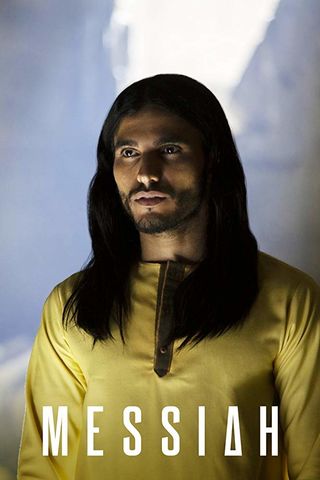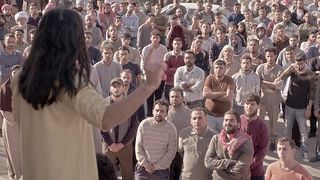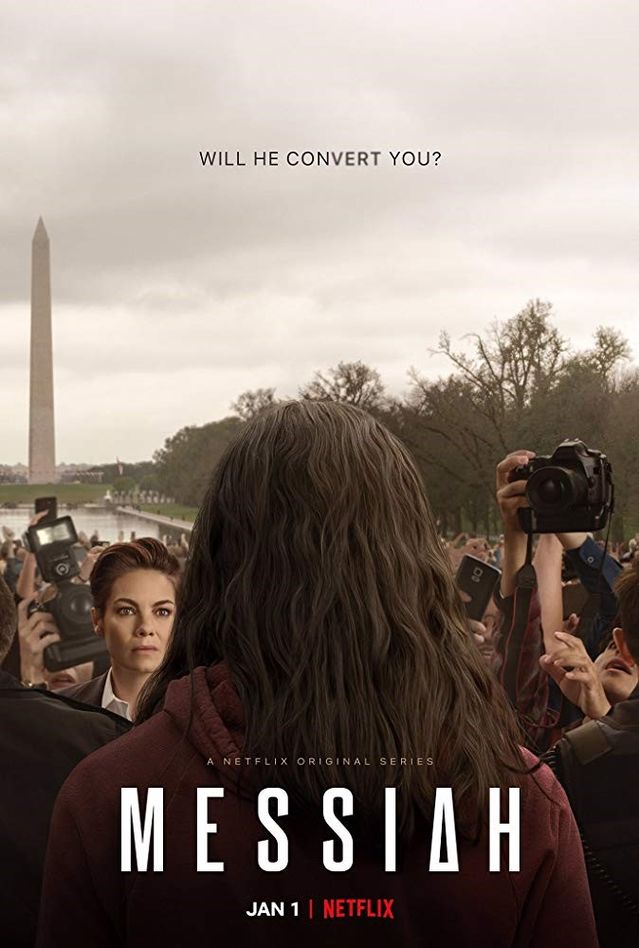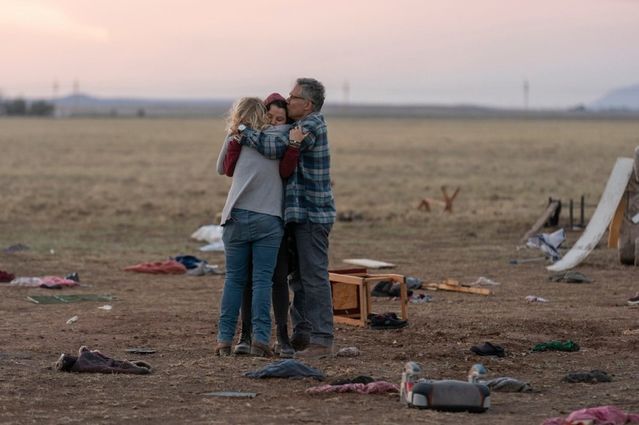Spirituality
Spiritual Hunger, Faith, and Illusion
Netflix’s Messiah series: a review.
Posted January 20, 2020
"Now faith is the substance of things hoped for, the evidence of things not seen." Hebrews 11: 1.

Why do humans, alone so far as we know on this planet, search for meaning? Millenia of oral and written history abundantly portrays a thirst to believe that life is bigger and more enduring than our quotidian experiences. We have an unending need to create heroes, those embodied with superpowers, stretching from the ancient world to today’s comic books (and films).
What we cannot—may hope to—see (or understand), the Hebrews called faith. It is a leap so many of us have taken throughout history or that many others seek to take. Paradoxically, perhaps ironically, doubt is intrinsic, a frequent co-traveler, in the pursuit of faith.
For the most part, religious beliefs, rituals, and institutions have served to quench a spiritual thirst, in both the East and West. But many religious denominations today have either lost considerable members of their flock; or, conversely, have become powerful magnets for ardent believers. Extremes in faith have always existed—but the world-wide-web, social media, radio, and television now have given them a more central stage, fostering greater public social divisions—almost everywhere we look.
Science, despite its great contributions, does not answer to the needs of faith. It has not spawned a spiritual alternative to religion.
What a propitious time, thus, to offer a global viewing audience a compelling and eloquent inquiry into matters of faith that perplex and defy rational understanding. Netflix’s Messiah (2020, 10 episodes), harnesses the power of storytelling and resurrects myth, doing so on the hypnotic canvas of film.
......
The Hebrew word for Messiah is Mashiach, alluding to one who is "anointed," a savior consecrated to restore a golden age, whatever that might be held to be. More mundane, but no less meaningful, the connotation is that a Messiah will restore humanity to a world in short supply of it.
One problem, however, with “evidence of things not seen” is that they may be as much a creation of the human mind as an “actual” phenomenon (I leave it to philosophers to untangle the difference if it exists). That’s because our minds are disposed to suggestion. To what has been termed “cognitive bias,” tendencies to see and believe what it is we want, facts notwithstanding. Messiah uses the trope of illusion, misperception, to evoke mystery and to challenge faith. Is what we have witnessed a miracle? Or not? Can we trust what we see? No. Ask any of the successful illusionists making a fortune in Las Vegas.
.......
Episode 1 of Messiah begins in contemporary Damascus, Syria, already brutally destroyed by years of war. ISIS Caliphate tanks and troops stand ready to invade, to decimate who and what remains. A middle-eastern man in his 20s, lean, intent, composed, and long-haired like images we have of Jesus, is speaking to a gathering of the city’s population. He is offering them hope. They call him Al-Masih, the Messiah (a role many have played, here done with a fine mixture of humble solemnity and irony by Mehdi Dehbi).

As the tanks begin to launch their ballistic fury upon the Damascans, an epic sandstorm erupts, for 43 days, foreclosing the invasion and “burying” the aggressors. We later learn that Al-Masih reportedly stood and preached in the raging storm for 30 days, without food or water. The birth of a myth.
This event, the first of Al-Masih’s “miracles,” produces a following of some two thousand Syrians—men, women, and youth. He leads their exodus from the ashes of their homeland. But they are not bound for Jordan to seek asylum. Instead, they follow him, unknowing, to the Israeli border. As they approach, at his “command,” they put down and bury their weapons. They lack water, food, and shelter, and now face heavily armed Israeli soldiers determined to halt their entry into the Promised Land.
......
A myth typically embodies a person, a hero (or heroine), with transformative powers that have no natural explanation. While detractors may claim fabrication, myths clearly stand the tests of time. We need heroes, demigods, Messiahs and legendary figures: Those who deliver to the oppressed or spiritually lost a promise of hope. Faith needs a messenger. Al-Masih refers to himself in Messiah as a messenger; at other times, he refers to himself even more powerfully as The Word.
.......
The show’s story hurtles forward as the Israeli border confrontation becomes dire. The desperation of the asylum seekers evokes a humanitarian cause, transmitted everywhere by the omnipresent media. The Israeli army and its Secret Police are ushered into action. A reckless, Shin Bet (Israeli internal secret police) agent, Avi Dahan (Tomer Sisley), abandons himself to proving there is no God, a difficult proposition to prove since this stranger, Al-Masih, knows his secrets. A CIA operative, Eva Geller (the arresting, in more than one way, Michelle Monaghan), anticipates widespread social destabilization and begins her hunt to prove Al-Masih a fraud.

The story is enriched by the use of acolytes, especially young men (and one Western teenager), chosen to embody and spread The Word. Jibril Medina (Sayyid El Alami), a teenager who never learned to read, is first among the chosen by Al-Masih, an acting role whose demands he more than exceeds. Other youths are enlisted, by vested local interests, to destroy the rise of Al-Masih. Messiah is replete with diverse preachers, Imams, teachers, searching families, leaders and followers, misogynists, a modern biblical stand-in for a prostitute, and legions of others. Ultimately, its turmoil explodes into the American heartland, which carries the White House into its wake, including the President who happens to be a Latter-Day Saint and his faithless aide-de-camp. In other words, this program has a lot of range.
The Messiah’s further cast of characters allows for other essential elements of myth: Namely, uncertainty, the shifting sands between good and evil, and the search for healing and a promised land. The anguished Dilley, Texas Baptist Preacher, Felix Iguero (John Ortiz), is fully drawn into the vortex, a victim of his own doubt. As are his alcoholic wife, Anna (Melinda Page Hamilton), and teenage daughter, Rebecca (Stefania LaVie Owen), suffering equally from the deadness of Dilley as she is of epilepsy. CNN’s lead reporter, Miriam Keneally (Jane Adams), ably serves as our witness to these inexplicable human happenings. Directing credits go to James McTeigue and Kate Woods. Michael Petroni is the show’s creative font.
......,.
If you watch this series, be prepared to be teleported, so to speak, from Syria (though not shot there), to Jerusalem and Tel Aviv, to Washington, DC, through the American Bible Belt, and on to Dilley, Texas, meant to represent a broken-down America town ripe for the next coming. Episode 2 begins in Dilley, Texas.

You may feel the letdown from the exotic intensity of the Middle-East and the fulsome power of DC, the locations of the first Episode. You may be tempted to abandon the series. Keep going. Dilley and its rural American poor, adrift characters are integral to the plot, and I imagine to engaging more than a bi-coastal, “educated elite” U.S. audience.
........
Have you seen, or heard of Lost? The ABC, 121 episode, six-season series (2004-2010) created by Jeffrey Lieber, J. J. Abrams, and Damon Lindelof. Lost broke about all viewing audience and award records for its era.
A jet plane crashes onto a South Pacific Island, and a strange and perplexing adventure begins. Lost was rich in mystery, science fiction, synchronicity (inexplicable, concurrent events suffused with meaning), apocalyptic events, and the supernatural. What happens to the stranded passengers defies explanation. It took a leap of (fictional) faith to stay with Lost, but if you did the rewards were plentiful.
Messiah reminds me of Lost. It also invites us to take a leap of faith. In both shows, what we observe will not, cannot be, supported by the evidence. Messiah, moreover, makes sure to keep rousing your doubts, to rattle your faith, leaving us all the more lost (sic).
.........
There is too much to tell, in volume not just spoiler material, as Messiah then depicts the tumult of a “Second Coming.” A repeated refrain in the show becomes, “…and what are we supposed to do with all this?” Good question, meant to stir us, not to provide an answer.
Will the coming of the Messiah bring more of the horrors predicted in Revelations, with bodily sores and seas turning to blood? With climate change scorching the earth (hmm, isn’t that happening today?) and other fearsome visitations? Messiah has its share of “through a glass darkly” (1 Corinthians 13:12). A psychic riptide pivots back and forth from the Middle East to America. Foreboding grows since we have little to support the persona of the kindly God of the Christians. Instead, a vengeful Hebrew God is conjured up, coupled with the merciless hand of fundamentalist zealots.
Will the Messiah, after God exacts his toll, deliver to those redeemed a homeland of “light” as Revelations concluded? The show, thus, presents us with a second question, “What does God want?” We are far from knowing, as Episode 10 fades to black. We are witness again to Al-Masih’s further “miracles,” and the deserts and shepherds reenter center stage.




